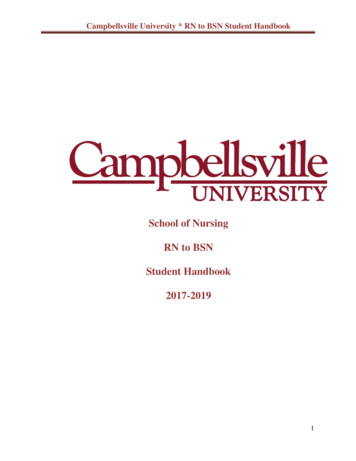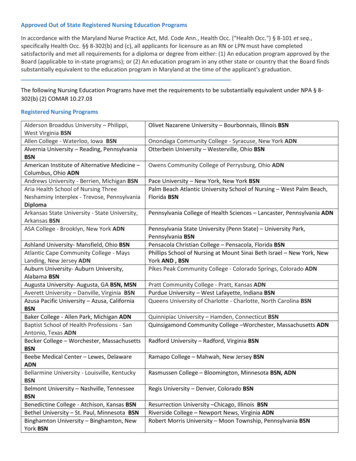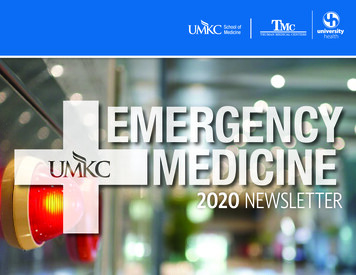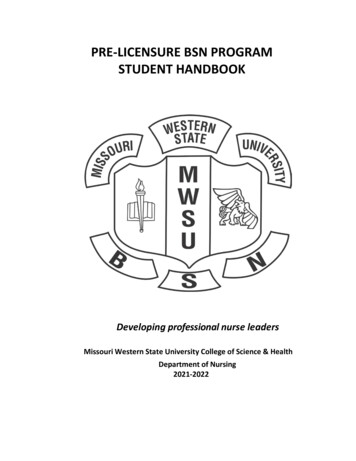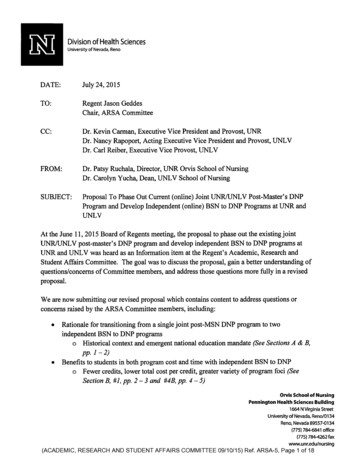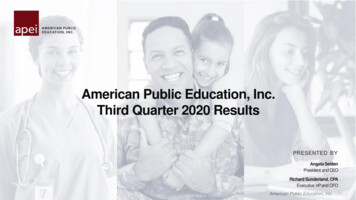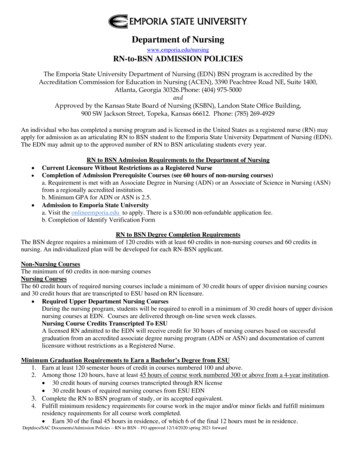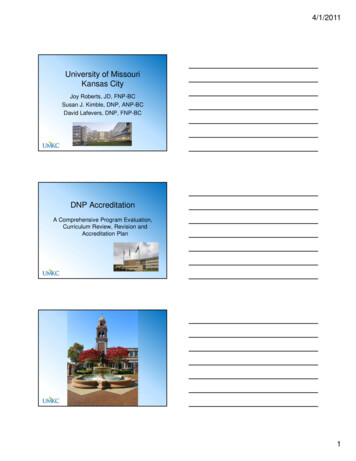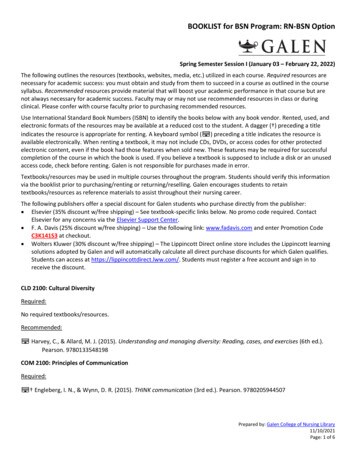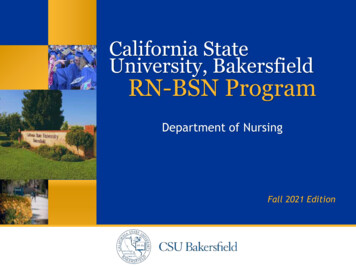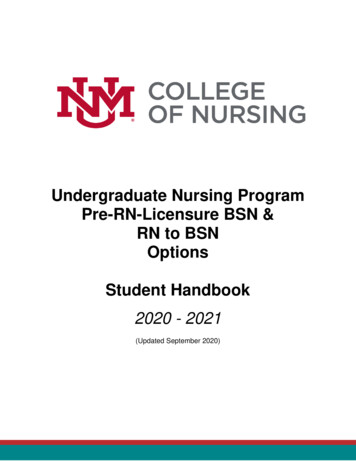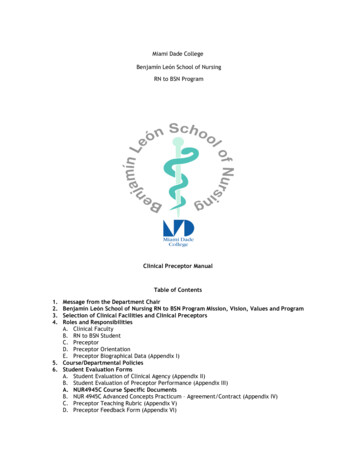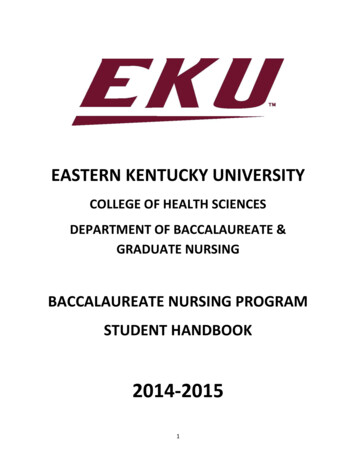
Transcription
EASTERN KENTUCKY UNIVERSITYCOLLEGE OF HEALTH SCIENCESDEPARTMENT OF BACCALAUREATE &GRADUATE NURSINGBACCALAUREATE NURSING PROGRAMSTUDENT HANDBOOK2014-20151
TABLE OF CONTENTSIntroduction .3Curriculum Information . 4-9Mission Statement & Preamble . . 5Philosophy of the Baccalaureate & Graduate Nursing Programs . .6Baccalaureate Nursing Education . .7Graduate Nursing Education . 8Professional Nursing Practice Outcomes . .9Curriculum Organization . .10-24Curriculum Organization Framework . .11Specific Organizing Concepts . 12Professionalism, Leadership and Ethical/Legal Practice . . 13Evidence-based Nursing Practice . .14Systems .15Professional Standards of BSN Program and Executive Summary . .16-17BSN Suggested Curriculum Plan .18-19Second Degree BSN Suggested Curriculum Plan .20RN-BSN Suggested Curriculum Plan . 21-23Baccalaureate Nursing Practice .24Legal and Ethical Responsibilities 25-27Legal and Ethical Responsibilities & Licensure 26Student Employment . 27Admission and Progression Information .28-43Admission and Progression – Traditional Option .29-33Admission and Progression – Second Degree Option .34-35Undergraduate Admission Categories .35-38Readmission 39-40RN-BSN Admission and Progression .41-43Clinical Information .44-51Required Documentation for Clinicals .45-48BSN Dress Code .49-51Academic Information 52-68Majors/Minors, Academic Advising and Registration, UWR .53Academic Standards .54-55Classroom Code of Conduct .56Attendance, Grading, Obtaining Course Grade, Grade Appeal . .57-59Math Problems .60EKU Academic Integrity Policy .61-66Academic Honesty Pledge .67Tobacco Products .68General Information .69-74Expenses .70Sources of Financial Aid 71Preparing for Graduation 72Student Nursing Association .73Departmental Committee Participation 74Appendix 75-80ANA Code of Ethics 76Mechanisms for Protection of Rights 77Blood-Bourne Pathogens Plan 78-80Forms 81-91NSC 232, 242 & 252 Recommendation Form .82Student Check-Off For Application Completion .83Traditional Option BSN Application .84Application for Consideration by Exception .85Application for Readmission .86Applicant From Another Nursing Program .87-89Second Degree Option Application 90Notification of Change .912
INTRODUCTIONThis handbook is for those students enrolled in Eastern Kentucky University’s BaccalaureateNursing Program to assist the student in gaining an understanding of the program and other mattersthat effect one’s status as a nursing student. This handbook is a supplement to two other documents:The Undergraduate Catalog and the University Handbook for Students, which are available for viewingonline, (www.eku.edu).From time to time during your years in college, you will find it necessary to consult one or all ofthese documents. The Undergraduate Catalog is thoroughly studied in HSO 100. Since most transferstudents do not take HSO 100, they must make a special effort to become familiar with theUndergraduate Catalog contents. Registered Nurse students usually enter as transfer students, and willalso need to study the three documents.Handbook formally reviewed by department Student Support CommitteeUpdated Summer 20143
CURRICULUMINFORMATION4
EASTERN KENTUCKY UNIVERSITYCOLLEGE OF HEALTH SCIENCESDEPARTMENT OF BACCALAUREATE & GRADUATE NURSINGMission StatementThe mission of the department is congruent with the mission of the college and university-to promotestudent success by providing high quality, accessible learning opportunities which encourage students toact independently, to think critically, to communicate effectively, and to practice professional oradvanced levels of nursing with integrity, enlightenment, and creativity; and to collaborate with regionalpartners to promote health.PreambleEastern Kentucky University’s Baccalaureate Nursing Program was organized in 1971. In the same year,the Meditation Chapel was dedicated and its influence can be seen in the B.S.N. cap and pin. Theprogram became part of the newly established College of Allied Health and Nursing in 1975. In 1995, theMaster’s of Science in Nursing Program was approved and implemented. The department name waschanged to Department of Baccalaureate and Graduate Nursing. In 1999, the college name was changedto the College of Health Sciences.The beliefs of the faculty and students relevant to nursing and health care are set forth in the statementof philosophy. The philosophy guides the educational program and learning environment. Thephilosophy mandates that faculty, students, and graduates adapt to the dynamics of nursing, health caresystems, and society.The Department of Baccalaureate and Graduate Nursing within the College of Health Sciences functionsas an autonomous educational unit deriving the broad outlines of it aims and functions from the corevalues of Eastern Kentucky University. The College of Health Sciences affirms the University’s core valuesof intellectual ability, sense of community, diversity, stewardship in place, accountability andexcellence.* The foundations of professional nursing education are congruent with the purposes of theUniversity and the College of Health Sciences. Graduate Nursing education builds on baccalaureatenursing education and reaffirms the core values of Eastern Kentucky University and the College ofHealth Sciences.*Eastern Kentucky University Bulletin, General Catalog(Revised and Approved by Faculty Organizations May 9, 2011)5
Philosophy of the Baccalaureate & Graduate Nursing ProgramsConsistent with the core values of Eastern Kentucky University and the College of Health Sciences, thefaculty of the Department of Baccalaureate and Graduate Nursing embrace the following beliefs aboutpatient, environment, health, nursing, professional nursing practice, baccalaureate nursing education,and graduate nursing education.PATIENTPatients include individuals, families, groups, communities, and populations. Each patient isunique and merits respect, support, and dignity. Patients develop and adapt in recognizable phases andpatterns. Patients continually seek meaning and purpose. Through participation in life’s experiences,patients grow, assume responsibility and develop across the lifespan. Patients are holistic beingsintegrating biological, psychological, socio‐cultural, and spiritual dimensions. The term “client” may beused interchangeably with “patient”.ENVIRONMENTEnvironment is the aggregate of all objects, conditions, forces, and ideas that interact withpatients. The elements of the environment include the physical, biological, sociocultural, andorganizational systems. A health promoting environment facilitates movement toward wellness.HEALTHHealth is a dynamic process between the patient and environment. Optimal health includesbiological, environmental, psychological, sociocultural, spiritual, and organizational influences. Healthreflects a patient’s ability, willingness, and resources to engage the environment in a manner thatmaximizes wellness.NURSINGNursing is an autonomous and caring profession. Nursing is an art and science that promoteshealth through patient-centered care. While respecting patients’ rights to self-determination, nursingprovides holistic care during health, illness, and death.6
BACCALAUREATE NURSING EDUCATIONPreparation for professional nursing requires liberal and professional baccalaureate education.Baccalaureate nursing education develops critical thinking, collaboration, and decision making.Baccalaureate graduates are prepared to function as providers of patient-centered care,designers/managers/coordinators of care, and members of a profession who are proactive in a changinghealth care system. Baccalaureate graduates must be professional, responsible, and accountable forevidence-based practice.Baccalaureate nursing education is a transformative process for students and faculty and is aprocess of reciprocal accountability and responsibility. Teaching is a cooperative, collaborative venture.Students and faculty share responsibility for the integration of experience, knowledge and skills. Facultyserve as role models and facilitators. Graduates are prepared to pursue lifelong learning, function in avariety of heath care settings, and delivery models, as well as specialize at the graduate level.Revision Approved: August 19, 2009Reviewed & Updated: February 5, 20107
GRADUATE NURSING EDUCATIONPreparation for advanced nursing roles is obtained through graduate education in nursing.Graduate education in nursing further develops the intellectual skills of critical thinking, analytic inquiry,and problem solving which were initiated in baccalaureate nursing education.Building upon the foundations laid by baccalaureate education, the faculty recognizes the needfor additional knowledge to prepare graduates for specialty practice and for advanced roles. Theevaluation of theory and research in nursing and related fields is imperative for graduates to incorporateevidence- based practice into their advanced nursing roles. A higher level of synthesis, analysis, andapplication of advanced nursing knowledge is essential for performance of advanced nursing roles. Theintegration of the additional knowledge, theory, and skills is obtained through graduate education innursing. The graduate develops professional concepts and behaviors in order to function in an advancedrole.Nurses prepared at the graduate level must collaborate with other health disciplines inproviding innovative health care delivery. They do so as full partners, sharing the responsibility fordelineating society’s health goals and developing health care policy. In addition, they function asadvocates for the health care consumer who has a right to health care, regardless of social class orethnic background.The faculty recognizes the University’s rural geographic setting which creates unique health careconcerns. The faculty is committed to the education of nurses prepared at the graduate level who willcontribute to the general health of the region’s rural population. The educational process at thegraduate level is collegial in nature and promotes independent, self-directed learning and selfevaluation. Students are required to communicate the results of their discovery, analysis, and synthesisof advanced knowledge both orally and in writing to prepare them for their increased responsibility inmaking contributions to the knowledge base of the discipline of nursing. Graduate education stimulatesthe learner to a lifetime of personal and professional development. As baccalaureate education servesas the foundation for professional nursing practice and for graduate study in nursing, graduateeducation in nursing prepares the nurse for more specialized and advanced roles in nursing. Graduateeducation in nursing prepares nurses to serve as advanced practice nurses, to serve in roles requiringother types of advanced nursing knowledge, and to serve as leaders in the health care system.Revision Approved 10/23/20098
BSN Professional Nursing Practice OutcomesUpon completion of the baccalaureate nursing program, the B.S.N. graduate:1. Treats patients as holistic, unique and self-directive with the right to make decisions forthemselves concerning health matters.2. Uses the nursing process to provide, manage, and evaluate culturally competent primary,secondary, and tertiary prevention for diverse clients across the life span in a variety of settings.3. Uses evidence-based nursing practice, critical thinking, research methodologies, informatics,and healthcare technology to provide therapeutic interventions, predict outcomes, andinfluence the delivery of health care.4. Assumes a leadership role in health care by communicating and collaborating with patients,health care professionals, and health care systems.5. Supports safe, quality, responsible, and economic interdisciplinary health care as a consumerand sociopolitical advocate within multiple health care systems.6. Promotes the ethical and legal practice of professional nursing.7. Demonstrates self-care, professionalism, accountability, and competence in nursing practice,with a commitment to advancing the profession of nursing.Revised 9/26/099
CURRICULUMORGANIZATION10
CURRICULUM ORGANIZATION FRAMEWORKThe major philosophical concepts provide direction for curriculum organization and outcomes.These concepts are derived from professional nursing education and practice, and environmentalfactors which include a rapidly changing health care delivery system. In an effort to develop acurriculum responsive to a dynamic health care delivery system, the faculty re-conceptualized thecurriculum schemata.Professional nurses must have the ability to define and conceptualize population parameters,and the health care needs of that population. Also, nurses must be able to recognize and predict shiftsin health care needs to develop effective nursing practice interventions. Thus, as client needs shift,individual courses can be adapted within the overall framework.All clinical courses:1.) examine health and selected health care problems of defined populations,2.) explore the epidemiology of the selected health care problems,3.) examine care management issues across the levels of prevention, with a focus onappropriate therapeutic nursing interventions and essential competencies required for safepractice,4.) analyze case management approaches to health care, with a focus on functioning as amember of an interdisciplinary health care team, and5.) provide opportunities for students to demonstrate knowledge and role-appropriate skills.The pre-clinical nursing courses provide students with basic, frequently used skills(psychomotor, communication, and nursing science domain overview) necessary for entry into theclinical setting.The health assessment, pathophysiology, and clinical drug therapy courses provide theknowledge and foundation necessary for making clinically effective decisions with clients in a variety ofsettings. The research course enhances critical thinking, problem solving, and decision making skills.The leadership and role transition courses offer opportunities to synthesize nursing competencies forsystems management and to critically analyze factors which shape nursing practice and effect change inthe health care delivery system.11
I. ProfessionalismA. LeadershipB. Ethical/Legal PracticeII. Evidence-based Nursing PracticeA. Nursing ProcessB. ResearchC. Informatics & healthcare technologyD. CommunicationE. CollaborationF. Critical thinkingIII. SystemsA. Patients/client system (individual, family, communities, populations)B. Health care systemsRevised October 2, 200912
Professionalism“Professionalism is defined as the consistent demonstration of core values evidenced by nursesworking to achieve optimal health and wellness outcomes in patients by wisely applyingprinciples of altruism, excellence, caring, ethics, respect, communication, and accountability(Interprofessional Professionalism Measurement Group, 2008). Professionalism also involvesaccountability for one’s self and nursing practice, including continuous professionalengagement and lifelong learning.” (AACN Essentials 2009, pg 26)LeadershipLeadership is the ability to apply learned skills by which nurses influence the direction of healthcare, the nursing profession, and the quality of health care for patients. Effective leaders areinnovative, flexible, and foster inter/intradisciplinary collaboration and communication.Ethical/Legal PracticeEthical practice is the implementation of moral principles and standards governing conduct.Legal practice is the adherence to the laws and regulations governing nursing.Reviewed & Updated: February 5, 201013
Evidence-based Nursing PracticeEvidence-based Practice: “Care that integrates the best research with clinical expertise andpatient values for optimum care” (IOM, 2003b). Evidence-based nursing practice is the deliveryof safe and effective patient-centered care across the lifespan.A. Nursing Process: Is a problem solving method which includes assessment analysis,planning, implementation, and evaluation. Critical elements of the nursing processinclude levels of prevention, safety, cultural sensitivity, and quality management inhealth care.B. Research: is a systematic, scientific inquiry into phenomena relevant to evidence-basednursing practice for the purpose of validating and developing knowledge of theprofession.C. Informatics & Health Care Technology: is the use of electronic systems to gather,monitor, and analyze data in the provision and improvement of patient care.D. Communication: is a goal directed dynamic, written, verbal, nonverbal, and electronicinteractive process. Communication involves contextual transmission, analysis,interpretation and evaluation of messages. Communication skills promoteinterpersonal, therapeutic, group, and professional relationships.E. Collaboration: is a process of working toward mutual goals to improve patientoutcomes. Collaboration involves collegial relationships with other members of thehealth care team, including patients.F. Critical Thinking: is the process of questioning, analysis, synthesis, interpretation,inference, inductive and deductive reasoning, intuition, application, and creativity(AACN, 1998; as cited in AACN, 2008, p. 36). Critical thinking underlies independent andinterdependent decision making. (AACN, 2008, p. 36)Reviewed and Updated: February 5, 201014
SystemsThe concepts of systems theory are integral to professional nursing practice. Systems functionthrough interdependent, interacting components. All systems are part of a larger system.A. The patient/client system includes the individual, family, communities, and populations.a. The individual is an integration of biological, psychological, sociocultural, andspiritual spheres. Although composed of similar systems and subsystems,individuals are considered across the life span in relation to their humandiversity, genetics, and growth and development.b. The family is an open system that continually interacts with its members and theenvironment. Family is defined by the individual.c. The community is either a geopolitical or phenomenological group of peoplewith shared interests, goals, identity, and/or physical boundaries.d. Population is any group with a common characteristic.Health care systems are systems of delivery of health care to individuals, families, communities,and populations. These systems operate within the context of local, national, and globalsocieties and processes. They are formed by policies that affect health outcomes. The nursingprofession interacts with health care systems to advance safe, compassionate, quality, costeffective, scientific, and ethical care among diverse populations.Reviewed & Updated: February 5, 201015
Professional Standards of BSN ProgramThe Essentials of Baccalaureate Education for Professional Nursing Practice, published by theAmerican Association of Colleges of Nursing in 2008, has been adopted as the professional standard toguide the undergraduate curriculum. The document specifies the essentials which are essential for allbaccalaureate nursing programs. These essentials are congruent with the curriculum organizingconcepts and are integrated into the baccalaureate curriculum.Executive SummaryFrom The Essentials of Baccalaureate Education for Professional Nursing Practice (AACN, 2008)This Essentials document serves to transform baccalaureate nursing education by providing thecurricular elements and framework for building the baccalaureate nursing curriculum for the 21stcentury. These Essentials address the key stakeholders’ recommendations and landmark documentssuch as the IOM’s recommendations for the core knowledge required of all healthcare professionals.This document emphasizes such concepts as patient-centered care, interprofessional teams, evidencebased practice, quality improvement, patient safety, informatics, clinical reasoning/critical thinking,genetics and genomics, cultural sensitivity, professionalism, and practice across the lifespan in an everchanging and complex healthcare environment.Essentials I-IX delineate the outcomes expected of graduates of baccalaureate nursing programs.Achievement of these outcomes will enable graduates to practice within complex healthcare systemsand assume the roles: provider of care; designer/manager/coordinator of care; and member of aprofession. Essential IX describes generalist nursing practice at the completion of baccalaureate nursingeducation. This Essential includes practice-focused outcomes that integrate the knowledge, skills, andattitudes delineated in Essentials I-VIII. The time needed to accomplish each Essential will vary, and eachEssential does not require a separate course for achievement of the outcomes. oThe nine Essentials are:Essential I: Liberal Education for Baccalaureate Generalist Nursing PracticeA solid base in liberal education provides the cornerstone for the practice and education of nurses. oEssential II: Basic Organizational and Systems Leadership for Quality Care and Patient SafetyKnowledge and skills in leadership, quality improvement, and patient safety are necessary to providehigh quality care. oEssential III: Scholarship for Evidence Based PracticeProfessional nursing practice is grounded in the translation of current evidence into one’s practice. oEssential IV: Information Management and Application of Patient Care TechnologyKnowledge and skills in information management and patient care technology are critical in the deliveryof quality patient care. oEssential V: Health Care Policy, finance, and Regulatory EnvironmentsHealthcare policies, including financial and regulatory, directly and indirectly influence the nature andfunctioning of the healthcare system and thereby are important considerations in professional nursingpractice.16
oEssential VI: Interprofessional Communication and Collaboration for Improving Patient Health OutcomesCommunication and collaboration among healthcare professionals are critical to delivering high qualityand safe patient care. oEssential VII: Clinical Prevention and Population HealthHealth promotion and disease prevention at the individual and population level are necessary toimprove population health and are important components of baccalaureate generalist nursing practice. oEssential VIII: Professionalism and Professional ValuesProfessionalism and the inherent values of altruism, autonomy, human dignity, integrity, and socialjustice are fundamental to the discipline of nursing. oEssential IX: Baccalaureate Generalist Nursing PracticeThe baccalaureate-graduate nurse is prepared to practice with patients, including individuals, families,groups, communities, and populations across the lifespan and across the continuum of healthcareenvironments.The baccalaureate graduate understands and respects the variations of care, the increased complexity,and the increased use of healthcare resources inherent in caring for patients.oLearning opportunities, including direct clinical experiences, must be sufficient in breadth and depth toensure the baccalaureate graduate attains these practice-focused outcomes and integrates thedelineated knowledge and skills into the graduate’s professional nursing practice. Clinical learning isfocused on developing and refining the knowledge and skills necessary to manage care as part of aninterprofessional team. Simulation experiences augment clinical learning and are complementary todirect care opportunities essential to assuming the role of the professional nurse. A clinical immersionexperience provides the opportunities for building clinical reasoning, management, and evaluation skills.17
EASTERN KENTUCKY UNIVERSITYCOLLEGE OF HEALTH SCIENCESDEPARTMENT OF BACCALAUREATE & GRADUATE NURSINGTRADITIONAL BSN CURRICULUM PLANFALL 2012 to CURRENTFIRST YEARFirst SemesterHSO 100CHE 105 &105LGen. Ed. 1APSY 200Gen. Ed. 4Gen. Ed.Second SemesterStudent Success SeminarChem. For Health Sci. IWritten CommunicationIntroduction to PsychologyNatural Science(Select from 3A or B, 5A, or 6)14333317BIO 171BIO 301Gen. Ed. 1BMAT 105Gen. Ed.Gen. Ed 1CHuman AnatomyHuman PhysiologyWritten CommunicationMathematics with Applications(Select from 3A or B, 5A, or 6)Oral Communication33333318SECOND YEARBIO 273MLT 209NSC 232NSC 242NSC 252NFA 201Third SemesterClinical MicrobiologyORMedical MicrobiologyHealth Assessment andPromotion ICommunication in NursingIntro to Professional NursingEssentials of Nutrition4*STA 2153NSC 332NSC 350NSC 380Gen. Ed.333315-16Fourth SemesterOr 270 or Gen. Ed(Select from 3A or B, 5A, or 6)Health Assessment and Promotion IIPathophysiologyAdult Health Nursing I(Select from 3A or B, 5A, or 6)3234315THIRD YEARFifth SemesterNSC 330NSC 386*STA 215Clinical Drug TherapyAdult Health Nursing IIOr 270 or Gen. Ed.(Select from 3A or B, 5A, or 6)Sixth Semester3103316NSC 390WNSC 392NSC 396Gen. Ed.Nursing ResearchMental Health NursingFamily Health Nursing(Select from 3A or B, 5A, or 6)257317(HESI M.C. given at end of NSC 396. If Students are belowstandard, they are required to enroll in NSC 378 in the 7th semester.)FOURTH YEARNSC 480NSC 484NSC 486Seventh SemesterHealth Care LeadershipAdult Health Nursing IIIPublic Health Nursing35513NSC 492NSC 495NSC 496Eighth SemesterComplex Client Health CareProfessional Role TransitionsApplication of Nursing TheoryFree Electives, as needed5229*(Application for Graduation and fee)* Statistics options include STA 215, STA 270, COR 400, CRJ 400, PSY 309, QMB 200, SOC 232, HEA 350, orapproved substitutions.**Applicationfor graduation is available online, http://www.health.eku.edu/graduation app packet.php.Applications should be submitted by April 30th for Fall graduation and October 30th for Spring graduation, alongwith your graduation fee.A minimum of 120 credit hours is required for the BSN degree.Class scheduling is dependent on student enrollment as well as faculty and clinical availability. The programreserves the right to alter the schedule plan as necessary to ensure a quality educational program.Revised Spring 2012, Updated Summer 201418
Required NSC courses:General Education (Support Courses which fulfill Gen Ed are in Bold):65 hours36 hours1.CommunicationA. ENG 101 or 105B. ENG 102, or HON 102C. CMS 100 or 21092.Mathematics (MAT 105)33.Arts and Humanities(One of each or two integrated)64.Natural Sciences (lab courses)-CHE 105 & 105L (4 hours)-Additional Course from Section 4 (3 hours)75.Social and BehavioralA. HistoryB. Social Science (PSY 200)66.Diversity-Two Courses6University:Orientation Course (HSO 100)1Wellness (NFA 201)3Writing Intensive Course (NSC 390W)2ACCT Course (NSC 492)5Other Support:BIO 171, BIO 301, BIO 273 or MLT 209, STA 215 or equivalentElectives13/12as neededTotal 120-12119
DEPARTMENT OF BACCALAUREATE & GRADUATE NURSINGEASTERN KENTUCKY UNIVERSITYRICHMOND, KENTUCKY 40475BACCALAUREATE NURSING PRELICENSURE 2ND DEGREE CURRICULUM PLAN21 Month PlanPre-requisite support courses which must be completed prior to admission to the Second Degree Option Nursing Major: BIO 171,BIO 273 or MLT 209, BIO 301, NFA 201, and STA 215 or approved substitutions.SEMESTER 1 (Fall)1st 8 WEEKSNSC 232 Health Assessment andPromotion I3NSC 262 Professional Nursing Concepts 4TAKEN OVER ENTIRE SEMESTERNSC 350 Pathophysiology2nd 8 WEEKSHealth Assessment andPromotion IINSC 380Adult Health Nursing INSC 332324*Professional Liability Insurance16 Hours Total for semesterSEMESTER 2 (Spring)NSC 330NSC 386NSC 392C
May 09, 2011 · BACCALAUREATE NURSING PROGRAM STUDENT HANDBOOK 2014-2015. 2 . Nursing Program to assist the student in gaining an understanding of the program and other matters . The health assessment, pathophysiology, and clinical drug therap
